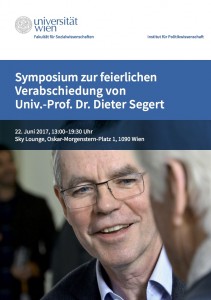Symposium zur feierlichen Verabschiedung von Univ.-Prof. Dr. Dieter Segert
Die Abschiedsvorlesung von Prof. Segert finden Sie unter folgendem Link:
Dieter Segert_Abschiedsvorlesung 22 Juni 2017
***
The Politics of East European Area Studies
Edited by Gareth Dale, Katalin Miklossy, Dieter Segert
Following the end of the Cold War and European Union enlargement, in what sense does Eastern Europe continue to exist as a meaningful geo-political concept? In addressing this question, contributors to this volume—Alex Cistelecan, Robert Bideleux, Katalin Miklóssy and Dieter Segert—tease out the implications for an ‘Area Studies’ approach to the region.
 They examine its contradictory situation within discourses of ‘orientalisation’: on one hand, posited as the ‘underdeveloped’ pendant to its western neighbours; on the other, largely Christian by religion and an integral part of a continent that dominated the world. They uncover the roots of area studies in the ‘colonial paradigm’ by which great powers promote the creation of predictive, ‘problem-solving’ knowledge that is immediately apprehendable for decision makers, helping them to take advantage of a region’s resources and strategic position, but which tends to homogenise the region’s geography and history. For critical inquiry, they argue, the challenge is to delineate transparently the reasons underlying Eastern Europe’s construction as an area of study, to identify the epistemological interests of motivated organisations such as funding agencies and political bodies, and to counter the ongoing orientalism of Western perspectives toward the East. This book was originally published as a special issue of the Journal of Contemporary Central and Eastern Europe.
They examine its contradictory situation within discourses of ‘orientalisation’: on one hand, posited as the ‘underdeveloped’ pendant to its western neighbours; on the other, largely Christian by religion and an integral part of a continent that dominated the world. They uncover the roots of area studies in the ‘colonial paradigm’ by which great powers promote the creation of predictive, ‘problem-solving’ knowledge that is immediately apprehendable for decision makers, helping them to take advantage of a region’s resources and strategic position, but which tends to homogenise the region’s geography and history. For critical inquiry, they argue, the challenge is to delineate transparently the reasons underlying Eastern Europe’s construction as an area of study, to identify the epistemological interests of motivated organisations such as funding agencies and political bodies, and to counter the ongoing orientalism of Western perspectives toward the East. This book was originally published as a special issue of the Journal of Contemporary Central and Eastern Europe.
***
Neuer Masterstudiengang „Interdisziplinäre Osteuropastudien“
Zum Wintersemester 2015/16 bietet die Universität Wien den neuen Masterstudiengang „Interdisziplinäre Osteuropastudien“ an. Das viersemestrige Studium bietet eine fortgeschrittene interdisziplinäre Ausbildung in den Sozial- und Geisteswissenschaften und vermittelt Kompetenzen für Ostmittel-, Südost- und Osteuropa. Die Studierenden erwerben vertiefte und spezielle Kenntnisse von Kultur, Gesellschaft, Politik und Geschichte mindestens einer der Länder des Raumes und die Fähigkeit, disziplinübergreifende Fragestellungen zu erkennen und zu bearbeiten, wobei osteuropäische Geschichte, Sozialwissenschaften oder slawische Sprachen und Kulturen im Studium einen Schwerpunkt bilden. Neben Fachwissen und Sprachkenntnissen werden den Studierenden durch Auslandsaufenthalte, Praktika, Sprachkurse und Summer Schools individuelle Zusatzkompetenzen vermittelt.
Am Masterstudiengang sind drei verschiedene Disziplinen – Geschichtswissenschaften, Sozialwissenschaften und Sprach-und Literaturwissenschaften – und folgende Fächer beteiligt: Osteuropäische Geschichte, Politikwissenschaft, Kultur- und Sozialanthropologie, Geographie, Rechtswissenschaft und Slawistik.
Näheres zum konkreten Studienaufbau finden Sie hier.
***
Crises in the Post-Soviet Space: the Case of the Ukraine
Internationale Konferenz
Freitag, 24. April 2014 – Samstag, 25. April 2015


